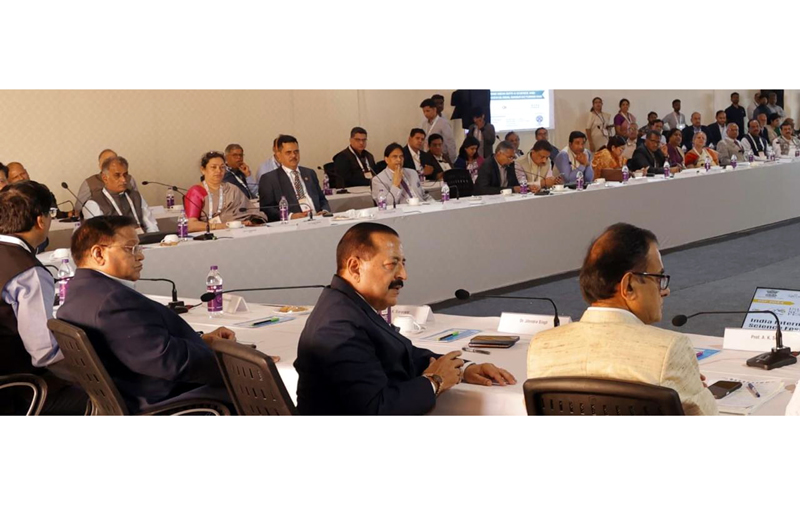Excelsior Correspondent
GUWAHATI, Dec 1: Speaking at the Round Table for Institutional leaders from across India, held alongside the India International Science Festival (IISF) 2024 in Guwahati, Union Minister of State (Independent Charge) for Science and Technology, Earth Sciences, and Minister of State for PMO, Department of Atomic Energy, Department of Space, Personnel, Public Grievances and Pensions, Dr. Jitendra Singh emphasized the significance of fostering robust StartUp-Industry links to drive sustainable economic growth in India.
The Round Table witnessed participation from leaders of key R&D institutions, Vice Chancellors of various universities, and later engaged industry leaders.
Dr. Singh highlighted the necessity of achieving seamless integration among Research, Academia, StartUps, and Industry to meet strategic objectives. He pointed out the critical role that science and innovation play in advancing India’s progress towards becoming a developed nation.
The Minister advocated for a strategic and collaborative approach among academia, research institutions, and industry to leverage India’s untapped potential and propel significant advancements.
He stressed the importance of utilizing India’s unique resources, combining its rich traditional knowledge with advanced technology to acquire a competitive advantage. By merging traditional wisdom with contemporary science, we create a distinctive Indian blend that differentiates us globally, he remarked.
Dr. Singh recognized the National Research Foundation as a significant advancement, noting its role in nurturing enhanced collaboration between public and private sectors, both locally and globally. Using examples from the biotech and space industries, he encouraged the establishment of international partnerships to bring external expertise and industry leaders into India’s scientific initiatives.
Asserting the necessity for stronger connections between industry and scientific research, Dr. Singh highlighted the importance of aligning scientific inquiries with the demands of the market. He underscored private sector investment as vital for sustaining startups and creating an environment conducive to innovation. He shared that the future of India hinges on cultivating a culture of public-private collaboration and cooperative problem-solving.
Dr. Singh further emphasized the need to cultivate a skilled workforce prepared to tackle the challenges of a swiftly evolving global economy. He advocated for the integration of groundbreaking technologies like Artificial Intelligence (AI), the Internet of Things (IoT), quantum computing, and sustainable manufacturing within research and educational frameworks, viewing these as critical for India’s future readiness.
He called for empowering young innovators and startups by leveraging institutional knowledge and facilities while incorporating initiatives like Startup India and the Atal Innovation Mission into institutional structures.


Leave a Reply